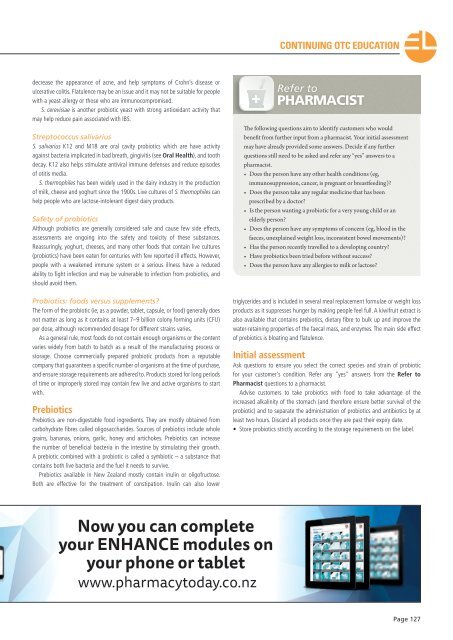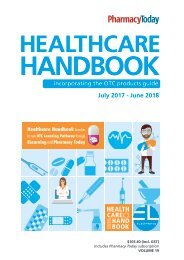2017 HCHB_digital
Create successful ePaper yourself
Turn your PDF publications into a flip-book with our unique Google optimized e-Paper software.
CONTINUING OTC EDUCATION<br />
decrease the appearance of acne, and help symptoms of Crohn’s disease or<br />
ulcerative colitis. Flatulence may be an issue and it may not be suitable for people<br />
with a yeast allergy or those who are immunocompromised.<br />
S. cerevisiae is another probiotic yeast with strong antioxidant activity that<br />
may help reduce pain associated with IBS.<br />
Streptococcus salivarius<br />
S. salivarius K12 and M18 are oral cavity probiotics which are have activity<br />
against bacteria implicated in bad breath, gingivitis (see Oral Health), and tooth<br />
decay. K12 also helps stimulate antiviral immune defenses and reduce episodes<br />
of otitis media.<br />
S. thermophiles has been widely used in the dairy industry in the production<br />
of milk, cheese and yoghurt since the 1900s. Live cultures of S. thermophiles can<br />
help people who are lactose-intolerant digest dairy products.<br />
Safety of probiotics<br />
Although probiotics are generally considered safe and cause few side effects,<br />
assessments are ongoing into the safety and toxicity of these substances.<br />
Reassuringly, yoghurt, cheeses, and many other foods that contain live cultures<br />
(probiotics) have been eaten for centuries with few reported ill effects. However,<br />
people with a weakened immune system or a serious illness have a reduced<br />
ability to fight infection and may be vulnerable to infection from probiotics, and<br />
should avoid them.<br />
Probiotics: foods versus supplements?<br />
The form of the probiotic (ie, as a powder, tablet, capsule, or food) generally does<br />
not matter as long as it contains at least 7–9 billion colony forming units (CFU)<br />
per dose, although recommended dosage for different strains varies.<br />
As a general rule, most foods do not contain enough organisms or the content<br />
varies widely from batch to batch as a result of the manufacturing process or<br />
storage. Choose commercially prepared probiotic products from a reputable<br />
company that guarantees a specific number of organisms at the time of purchase,<br />
and ensure storage requirements are adhered to. Products stored for long periods<br />
of time or improperly stored may contain few live and active organisms to start<br />
with.<br />
Prebiotics<br />
Prebiotics are non-digestable food ingredients. They are mostly obtained from<br />
carbohydrate fibres called oligosaccharides. Sources of prebiotics include whole<br />
grains, bananas, onions, garlic, honey and artichokes. Prebiotics can increase<br />
the number of beneficial bacteria in the intestine by stimulating their growth.<br />
A prebiotic combined with a probiotic is called a symbiotic – a substance that<br />
contains both live bacteria and the fuel it needs to survive.<br />
Prebiotics available in New Zealand mostly contain inulin or oligofructose.<br />
Both are effective for the treatment of constipation. Inulin can also lower<br />
Refer to<br />
PHARMACIST<br />
The following questions aim to identify customers who would<br />
benefit from further input from a pharmacist. Your initial assessment<br />
may have already provided some answers. Decide if any further<br />
questions still need to be asked and refer any “yes” answers to a<br />
pharmacist.<br />
• Does the person have any other health conditions (eg,<br />
immunosuppression, cancer, is pregnant or breastfeeding)?<br />
• Does the person take any regular medicine that has been<br />
prescribed by a doctor?<br />
• Is the person wanting a probiotic for a very young child or an<br />
elderly person?<br />
• Does the person have any symptoms of concern (eg, blood in the<br />
faeces, unexplained weight loss, inconsistent bowel movements)?<br />
• Has the person recently travelled to a developing country?<br />
• Have probiotics been tried before without success?<br />
• Does the person have any allergies to milk or lactose?<br />
triglycerides and is included in several meal replacement formulae or weight loss<br />
products as it suppresses hunger by making people feel full. A kiwifruit extract is<br />
also available that contains prebiotics, dietary fibre to bulk up and improve the<br />
water-retaining properties of the faecal mass, and enzymes. The main side effect<br />
of prebiotics is bloating and flatulence.<br />
Initial assessment<br />
Ask questions to ensure you select the correct species and strain of probiotic<br />
for your customer's condition. Refer any "yes" answers from the Refer to<br />
Pharmacist questions to a pharmacist.<br />
Advise customers to take probiotics with food to take advantage of the<br />
increased alkalinity of the stomach (and therefore ensure better survival of the<br />
probiotic) and to separate the administration of probiotics and antibiotics by at<br />
least two hours. Discard all products once they are past their expiry date.<br />
• Store probiotics strictly according to the storage requirements on the label.<br />
Now you can complete<br />
your ENHANCE modules on<br />
your phone or tablet<br />
www.pharmacytoday.co.nz<br />
Page 127



